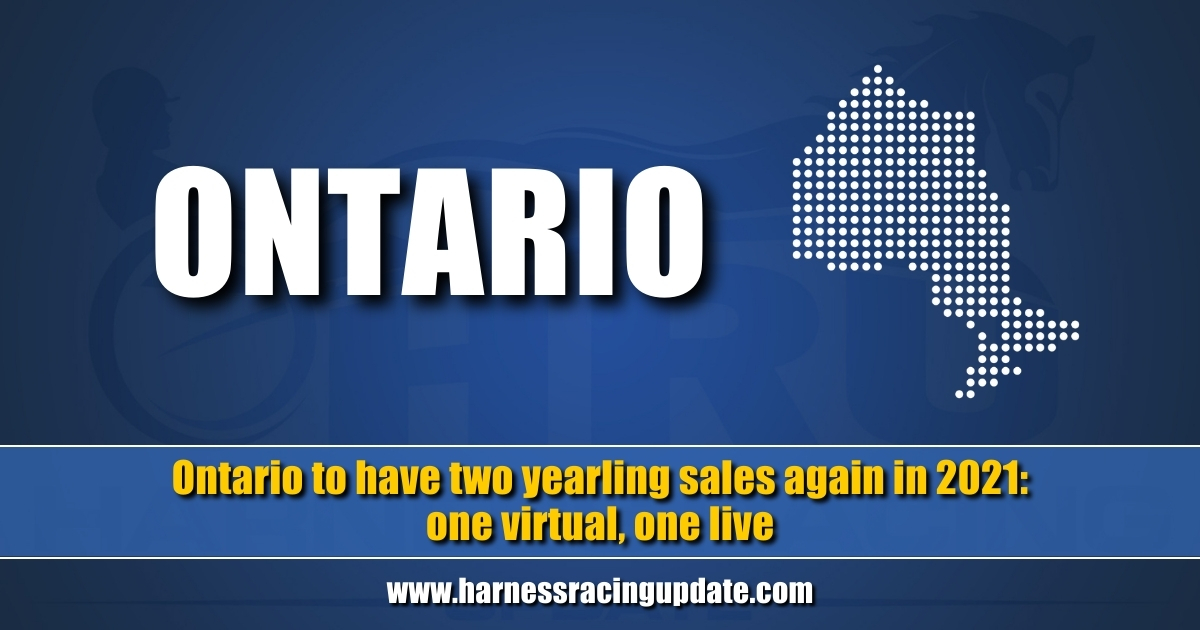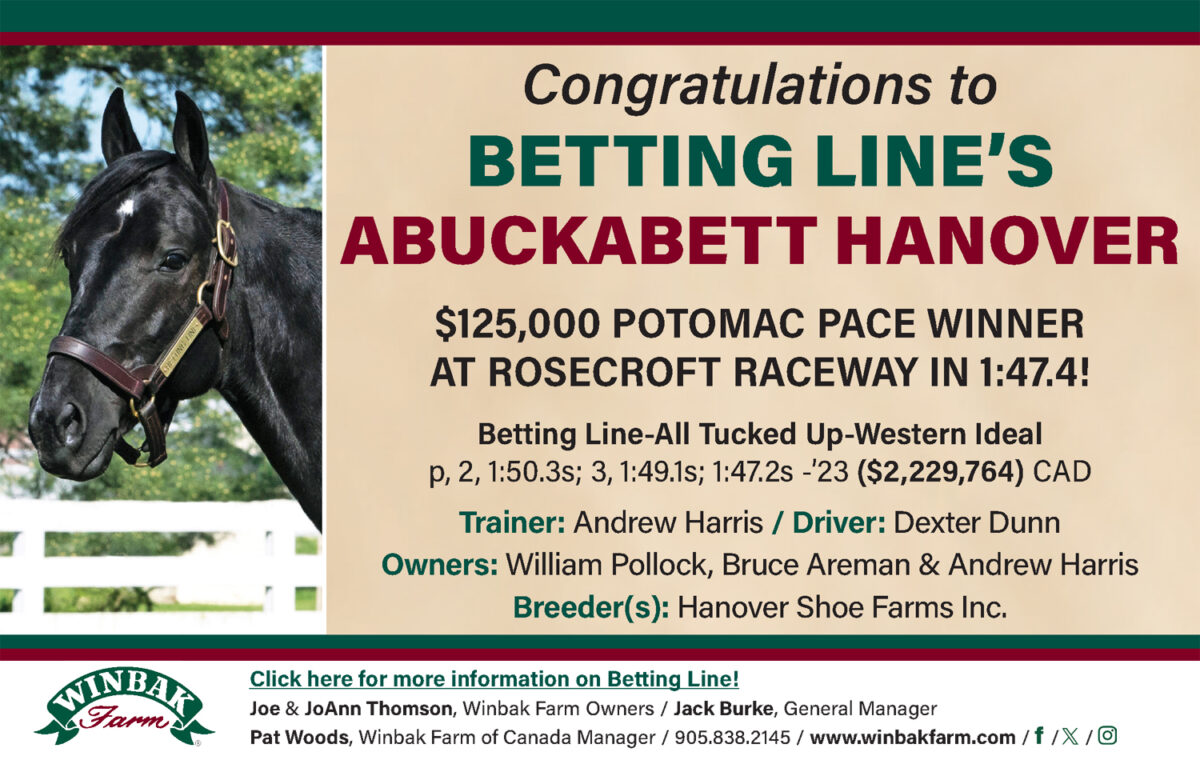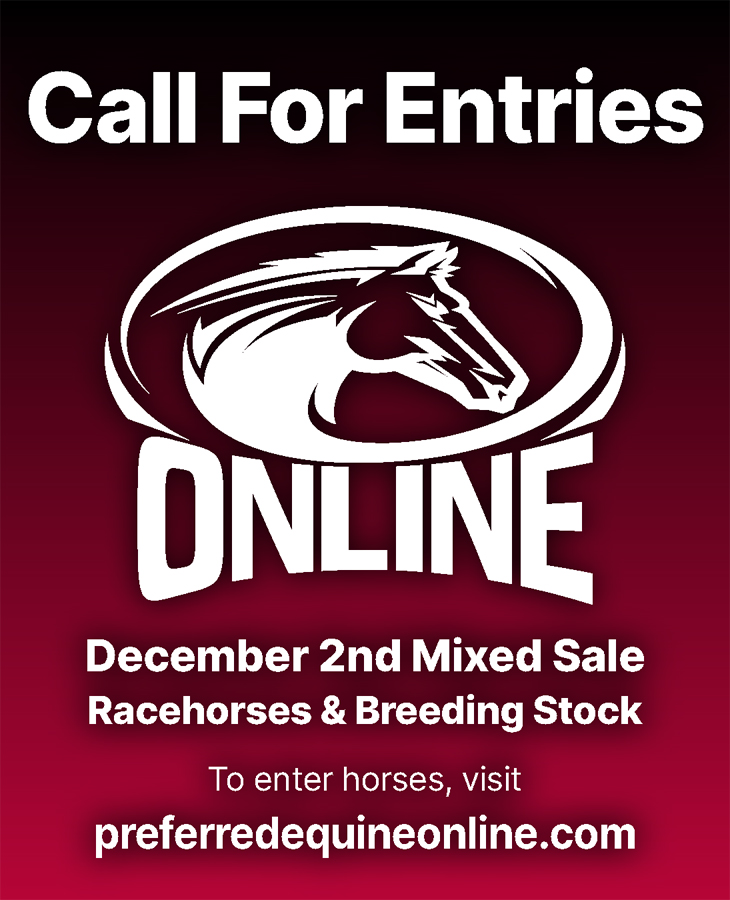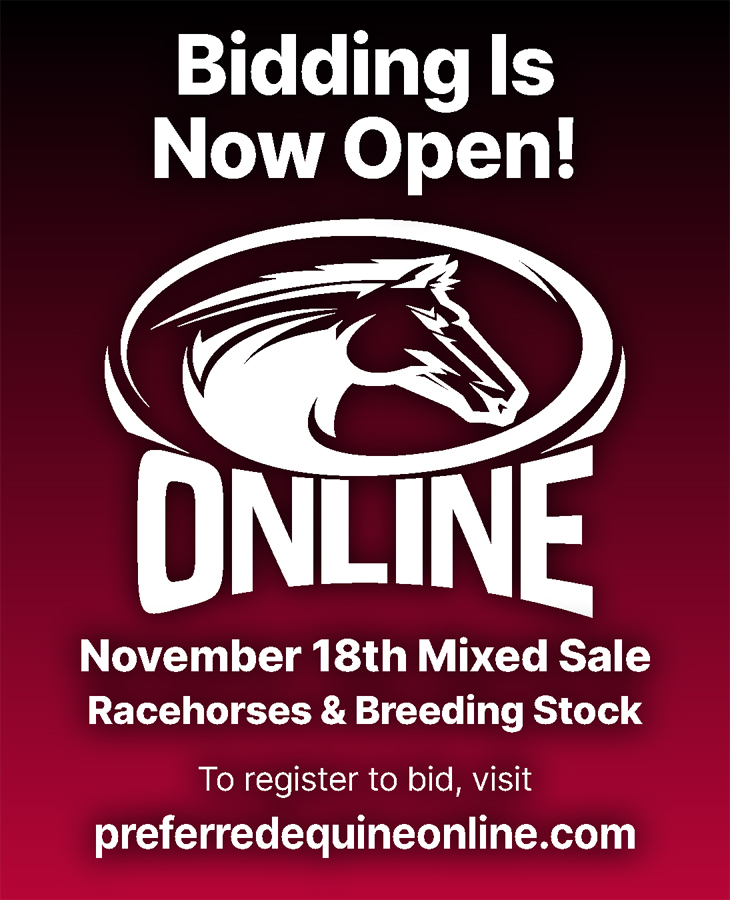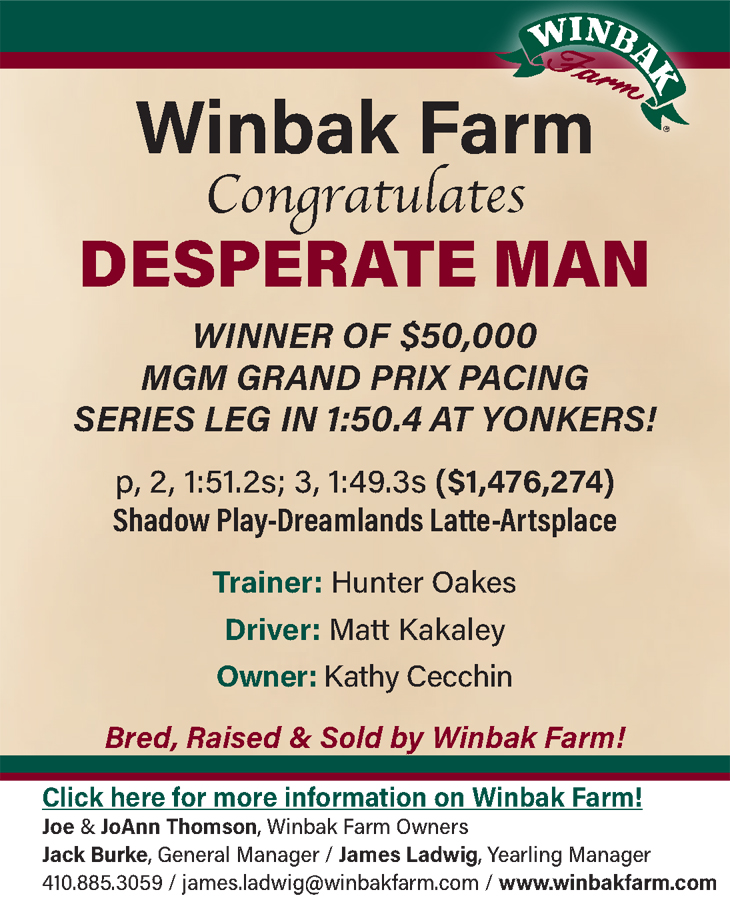Ontario to have two yearling sales again in 2021 — one virtual, one live
The Ontario Select Yearling Sale will be a traditional live auction held on Sept. 26. The London Virtual Yearling Sale will be an online only auction beginning Oct. 16 on ongait.com.
by Dave Briggs
Ontario’s yearlings sales will be conducted in 2021 as they were in 2020, sale organizers have confirmed. The London Virtual Yearling Sale will be held entirely online again this year. The Ontario Select Yearling Sale will be a traditional live auction — most likely at Winbak Farm of Ontario — with the ability to also bid online.
Prior to the COVID-19 pandemic, most Ontario yearlings were sold through a traditional auction at the London Select Yearling Sale at the Agriplex at The Western Fair District adjacent to The Raceway. Due to health restrictions and the fact the Agriplex has been used as a COVID-19 field hospital and vaccination site since early in the pandemic, the loss of its traditional home led London sale organizers to move the sale to an online auction only through www.ongait.com in 2020.
“It will be entirely online again,” said sale manager Ann Straatman of the 2021 auction. “That’s because our venue is still a field hospital and the rental is going to continue until November, so there’s not a chance for us to put a sale set up in there while it’s still being used for vaccinations.”
So far, Seelster Farms — where Straatman serves as reproduction manager — and Stonebridge Farm have committed to selling at the Virtual sale. Winbak, Preferred Equine, Twinbrook, Erinwood and Princeton Farms have committed to selling at the Select sale.
Ontario Select Yearling Sale manager Pat Woods said the reason for holding an in-person, traditional auction is, “we just feel with yearlings that people want to see them. They want to see what they are buying. They want to just take that last look at it before it goes into the ring. It’s what the trainers and owners are telling us they want.
“I’ve always felt that a live auction is good for the business. It’s good for people in the business to get together and have a drink, a talk, go out for dinner. There’s been a lot of great partnerships on horses that came out of the sale. You know, two guys are bidding that maybe don’t have enough money separately, but they come together to buy the horse that they want and it goes on to be the next great champion… and it all happened because they were sitting next to each other at the sale or gave each other a nod to go partners on it and then they own the horse. You just can’t do that online, or at least not as easily.”
LAST YEAR’S VIRTUAL NUMBERS
In 2020, the London Virtual Yearling Sale — the only major standardbred sale in North America conducted entirely online — saw 102 yearlings collectively grossed $3,312,990 for an average of $32,480 (Canadian dollars). As a comparison — which is admittedly imperfect since the 2019 auction was a traditional live auction where nearly three times the number of yearlings were sold — the 2019 two-day London sale grossed $6,285,000 for 291 sold, producing an average of $21,598. By that imperfect measure, 2020’s online average was up more than 50 per cent over last year’s traditional sale average.
“I think most (consignors) would say that they had a successful sale,” Straatman said. “I didn’t have any negative feedback. That’s the only thing that I can say for sure. I got a lot of negative comments before the sale, and mostly from buyers, but they were the same buyers that participated in the sale.
“It does mean more planning on the part of the buyer (to inspect yearlings). People think it’s easier for the consignor, but there’s really as much or more work to do it this way for consignors because people are coming more to the farms, so it’s more weeks of preparation ahead of time to accommodate people inspecting your yearlings. It’s a compromise on both sides, but I think we’ve proven that it’s a successful model and I think we can build upon that. I’m certainly open to suggestion on how we can make it better, but I’m pleased with how last year’s sale turned out.
“One thing I’m hoping is that, by the fall, a lot of people will be vaccinated and that the pandemic restrictions may be lifted enough that we could hold an Open House with all consignors in the sale, to welcome people on the weekend that traditionally would have been our sale… Even if we can all plan an Open House at the same time, then buyers and owners and trainers can go around to the farms on that weekend, much the same as they would go to the sale, and view the horses that they are interested in and see them as close to the auction time as possible… Of course, that will be pandemic pending and restrictions pending for Ontario,” Straatman said.
Virtual auctions will open on ongait.com beginning Oct. 16 and will begin closing on Oct. 18. Last year, the first of three blocks of horses went on sale at 8 a.m. with bids closing approximately 52 hours later beginning at noon in 10-minute intervals for each horse on the block. Any bids that came in at the last second before a horse’s auction closed extended the bidding window an additional two minutes to allow other bidders to make counter bids.
Entries for the Virtual sale will close on April 30.
LAST YEAR’S SELECT TOTALS
The inaugural Ontario Select Yearling Sale, held at Winbak Farms in Inglewood, ON, saw 110 yearlings collectively gross $2,247,000 for an average of $20,427.
This year’s Select sale will be held on Sunday, Sept. 26 — likely at Winbak, but not 100 per cent set as the location as of press time. The sale date falls the day after the Mohawk Million, a $1 million event for 2-year-old trotters at Woodbine Mohawk Park, which is located about 45 minutes from Winbak Ontario.
“People can come down on the Saturday and pop by Winbak Farms and… look at over 100 horses here and then go to the racetrack that night and come back the next day and spend some of their hard-earned money,” Woods said.
Woods said the amenities offered to those that attend the Select sale will be dependent on, “following with the public health and government restrictions 100 per cent. Whatever they put in place is what we’ll follow, to the tee, the same as we did last year. We’re hoping that things will be more open and we’ll be able to have more people here on site… Depending on the number of people, we will be adding more food trucks, more seating and all the rest of it.”
Last year, the Select sale was held on Oct. 17.
“We’re always going to try to be more efficient and do things better, make it easier for people to see. One of the reasons that we moved it up to September was for weather purposes. We still have nice weather, here in Ontario in September, so it just makes it better because part of the venue is under a tent,” he said.
Entries for the Select sale will close on June 1.
MERITS OF A VIRTUAL SALE
Straatman said a virtual-only sale proved to have, “a lot of merit. It’s certainly safer for the yearlings, to only have to be transported once. Safer, as far as a control method. If one horse is sick in the building there’s the potential of all of them getting sick, so that’s easier on the horses. It’s nice to have them just picked up from the farm afterward, and certainly there were a lot of questions ahead of time about horses getting picked up, but I think everyone was able to work it out with their buyers and horses were picked up promptly. I think that’s an advantage.
“Certainly, the rental of the facility is one of our biggest costs and being able to do it without that rental is a big savings for the sale company.”
Straatman said after this year’s auction concludes, sale organizers will discuss whether to go back to a traditional sale or stay virtual only for 2022.
“I think we would have to weigh how the 2021 virtual sale goes and weigh it against the wishes of the buyers and the sellers,” she said.
Straatman said last year’s Virtual sale was a learning experience, “but I think we’ve created a template of what buyers want to see. The photographs and the walking videos are certainly new for this industry, but I think it’s a good advertising tool and the amount of exposure you can get for your yearling by doing it virtually was even more than I thought. The statistics that I got from our London site, almost 1,500 views for each yearling and then on the ongait site, more than 4,000 views per yearling on average. I think that’s huge exposure.”
This year, the Virtual sale has a new, flat-fee model to equally share thecost of the pedigree production, catalogue creation, catalogue distribution and centralized website, Straatman said.
Also, this year,horses will be sold in Canadian dollars on ongait.
“The reason they were not sold in Canadian dollars last year was that the terms and conditions in our catalogue, which was printed well before the sale, had terms that the horses would be sold in American dollars and I couldn’t change that before the sale,” she said.
Regardless of whether horses are sold live or virtually, Woods said, “in all honestly, it all comes down to quality of horse. Some horses are going to oversell, some horses are going to undersell. At the end of the day, if you have the right horses that people are looking for, you’ll get paid for it.”
“Exactly,” Straatman said. “I’ve always said, ‘Buyers are very smart, you can’t hide a good horse from them. They’ll find you.’ They are very savvy business people and they will find the horses they are most interested in.”







